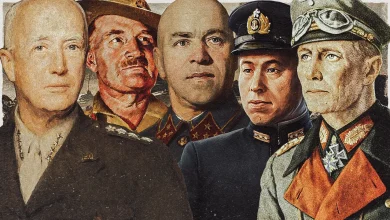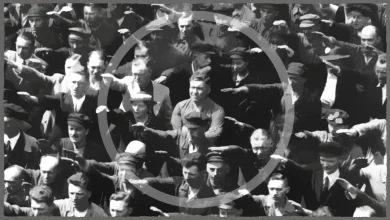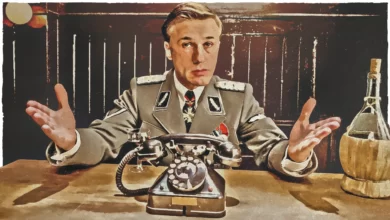Dietrich von Choltitz – General who refused to burn Paris to the ground
Hitler's Third Reich was rapidly crumbling before his very eyes; the vast empire that had once spanned from Tripoli to Rome to Kyiv was now shrinking, drawing ever so close to Berlin. Also, Paris was still under Nazi control, but not for long. By the summer of 1944, Allied forces were advancing through France, and the population in the City of Light was ardently revolting against its Nazi occupiers. Hitler, by now a mere shell of the man he had been just a few years before, was visibly ill and vehemently paranoiac and was determined to turn Paris into dust before anyone else could have it. The dictator also had the perfect man in mind for such a grim task, and his name was Dietrich von Choltitz. A soldier from a military family who never questioned orders, von Choltitz was amply experienced with Germany's scorched earth policy, having razed several cities on the Eastern Front. As such, Hitler appointed von Choltitz as the Military Governor of Paris, and on August 23, he received a terrifying order from the Fuhrer: "Paris must not pass into the enemies' hands, except as a field of ruins." The directive was clear: von Choltitz had to bring down the Eiffel Tower, burn Notre Dame and the Invalides, blow up the 65 bridges of Paris, and turn its museums and palaces to rubble before withdrawing from the city. It is said that as the Allies surrounded the French capital and his men awaited orders to once again raze a city before fleeing, von Choltitz felt overwhelmed with remorse and decided to disobey an order for the first time in his life, even if it came directly from Adolf Hitler…

A Broken Hitler
General Dietrich Von Choltitz had met Adolf Hitler once before; during a summer 1943 conference on the Russian front, they had spent time together among several high-ranking officers. Reportedly, the young aristocrat officer had been appalled by the dictator’s lack of table manners during a meal, but was otherwise mesmerized by the formidable personality and contagious confidence the Fuhrer displayed.
Hence, von Choltitz was visibly ecstatic when the Fuhrer personally summoned him a year later to be assigned an important task. The officer had reasons to expect good news; he was just arriving from three years of distinguished service on the Russian front.
Von Choltitz came from a long lineage of Prussian military tradition; he had been bred to respect military hierarchy and value obedience above all. Along with his strategic wit, such traits brought him success, leading the German invasion force into Holland in the spring of 1940, where he commanded the bomber formations that pulverized Rotterdam before the city had a chance to surrender.
Later, in the July 1942 siege of Sevastopol, von Choltitz’s regiment was so devastated that he forced Russian prisoners of war to carry shells and load the guns being used against their brothers. He was severely wounded, but he clung to his life even when most other German soldiers in his unit perished.
A year later, von Choltitz obediently enacted the Fuhrer’s scorched-earth policy in the east, making sure that the advancing Soviets found nothing but smoldering rubble in the wake of the retreating Wehrmacht. For von Choltitz, his obedience and dedication were about to be rewarded. But in the Fuhrer’s eyes, the officer was a ruthless city burner, which was precisely what he needed for this operation.

Von Choltitz would later reflect on the unfortunate circumstances that turned him into a destroyer of cities: “Since Sevastopol, it has been my fate to cover the retreat of our armies and destroy the cities behind them.” As von Choltitz entered the wolf’s lair on August 6, he was suddenly confronted by a completely different Hitler, to the one he fondly remembered.
Renowned historian and biographer Jean Edward Smith described the dreadful encounter: “As soon as he saw the Führer, Von Choltitz realized the war was lost.” Before him was: “An old, bent-over, flabby man with thinning gray hair — a trembling, physically demolished human being.”
Hitler was furious and nonsensical, constantly ranting about his Generals and cursing the recent attempt on his life. The dictator spoke in abusive language while reportedly spitting froth out of his mouth, and drops of sweat trickled down his face while he spoke vigorously about the execution of the generals.
Von Choltitz recalled: “I saw in front of me someone who had lost his mind… The fact that the life of our nation was in the hands of an insane being who could no longer judge the situation or was unwilling to see it realistically depressed me immensely.”
The general emerged from that meeting as the new Military Governor of Paris, but the title meant little to him; it was clear that the war effort was hopeless, that Hitler was insane, and that his assignment was just yet another scorched-earth task.
Draconian Measures
A completely disillusioned von Choltitz boarded a train to Berlin to briefly see his wife, Uberta, his daughters Maria Angelika and Anna Barbara, and his infant son, Timo. While on the train, he had a chance encounter with SS Reichsleiter Robert Ley, the German Workers’ Front leader.
Conversing over cigars, they traded news of their dealings of the past few days, and Ley told his comrade of a new law that had been issued by Hitler that very afternoon. The Sippenhaft law, inspired by the bomb plot on Hitler’s life, essentially made hostages of the families of front-line soldiers and officers. If a German soldier deserted, committed treason, disobeyed, or simply performed poorly, his next of kin risked being executed by the Third Reich.

The news pushed the already disheartened von Choltitz over the edge; the two recent meetings had completely thrown his world upside down, and his life of blind obedience suddenly felt so apparent and meaningless.
A City in Chaos
When von Choltitz arrived in Paris to assume his new position, he quickly learned how dire and complex the situation in the city was. On the one hand, General Dwight Eisenhower’s troops were drawing close to the town, and the liberation assault was expected to commence any day now.
On the other hand, von Choltitz only had about 20,000 men at his disposal, and the approaching American troops were not his only problem; Paris was in violent turmoil, Communist rebels had risen up against the German occupiers, and they were unleashing a guerrilla campaign on the streets of Paris. To make matters worse, he and his group of loyalists were also rapidly gaining power and being pressured by the public to establish an independent government in the city.
Unbeknownst to Paris’s military governor, General Eisenhower debated whether to liberate Paris now or postpone the battle. Paris Mayor Pierre Charles Tattinger was pressuring the General to act as soon as possible to avoid Paris falling into a Communist regime, but the Allies knew that if they sent troops to Paris now, their overall liberation efforts in France would suffer a severe setback.
The situation in the French capital was a ticking bomb, with a violent race to see which faction would seize power sooner, the Allies, the Communists, or the Gaullist forces. Von Choltitz stood amid this chaos while constantly being pressured to raze the city.

Then, on August 17, the German general received an urgent telegraph from Feldmarschall Gunther von Kluge, that read: “I give the order for the neutralization and destruction envisaged for Paris.” German engineers had already started to prepare for the destruction of Paris, and many of the city’s bridges had already been set up with explosives, while they had stored significant amounts of U-boat torpedoes in the underground tunnels that could be triggered when the order was given.
Despite some historians’ reports that von Choltitz didn’t have the men and resources necessary to destroy the city, the Germans had already mined the cellar of Les Invalides with enough explosives to blow up the French Army Museum, as well as the military art gallery, 400-year-old barracks, and Napoleon Bonaparte’s tomb.
Furthermore, on August 23, four SS engineers inspected the supports of the Eiffel Tower, looking for the best spots to place charges. The plan was well in motion to destroy the City of Lights; all that was needed now was von Choltitz’s order.
The Moment of Truth
As Paris descended into madness and savagery with Communist rebels attacking more and more German soldiers and the already dwindling Nazi troops being reassigned to the south of the city expecting the Allied incursion, von Choltitz found himself facing unbearable pressure to begin the destruction of Paris.
Then, in a mind-blowing outburst, von Choltitz put his and his family’s lives on the line by lying to the chief of staff of Army Group B, Generalleutnant Hans Speidel, and informing him that the city’s devastation had already begun. As he spoke, the City’s Military Governor secretly hoped that the Allies would liberate the city as soon as possible.
Meanwhile, not wanting to leave the entirety of the task to von Choltitz, Hitler also ordered the Luftwaffe to bombard the city; however, von Choltitz fought back, commanding to halt the attack on the pretense that the raid would hit numerous German positions.

The Allied top brass had hesitated for months whether to invade Paris or continue liberating the rest of France. Moving onto Paris meant saving it from the Nazi scorched earth policy but at the cost of risking delaying the liberation of the rest of the country before the winter months.
Still, as if he could hear von Choltitz’s plea, General Eisenhower finally decided to liberate Paris after continuous pressure from the city’s mayor and Gaullist representatives who convinced him that the city would either be destroyed or fall to Communist rebels if he didn’t act now.
The Allied troops then advanced practically unopposed through the weak German defenses, as the fewer than 20,000 demoralized men defending the city mostly surrendered at the sight of the American forces.
Aftermath
While the Allied advance was taking place, von Choltitz did all he could to stall the city’s destruction, and only a few bridges were blown up, with most landmarks remaining intact.
US forces soon entered the governor’s office, where von Choltitz ceremonially surrendered to the Allies to be taken as a prisoner of war. Then, as he was taken out of the building, Allied soldiers had to protect him from being lynched by the furious Parisian mobs who had no idea what he had just done.

Despite the colossal historical value of liberating Paris, Eisenhower’s decision came at a high cost. Allied oil reserves had been exhausted, and the German forces that escaped reached the protection of the Siegfried Line. The Western Front would stagnate for several months as winter drew close, and there would be brutal carnage in Hurtgen Forest.
Meanwhile, the British would be obliterated at Arnhem, followed by the Battle of the Bulge. What’s more, innumerable innocent people would continue perishing in concentration camps while awaiting Allied liberation. It was a terrible price to pay to save one of the most important cities in Europe.
Throughout the decades, many experts disputed von Choltitz’s role as the so-called “savior of Paris,” stating that the man merely clung to the idea in order to save face as the Third Reich crumbled into pieces, and adding that by the time he was given the order to go on with the attack, he had little resources left to execute the command.
Still, other accounts describe many Parisian landmarks as already being rigged for detonation, and von Choltitz himself claimed to have saved the city till the day he passed: “If for this first time I disobeyed (an order), it was because I knew Hitler was crazy.”



